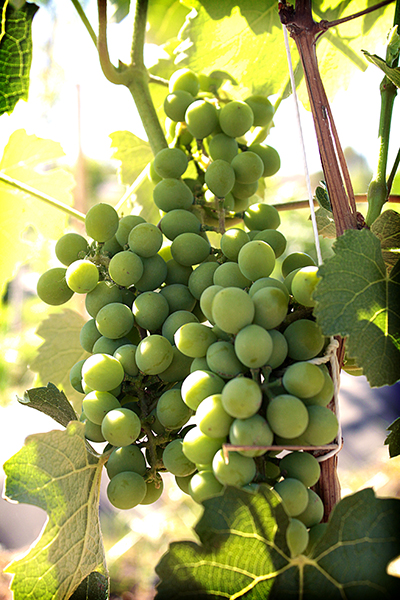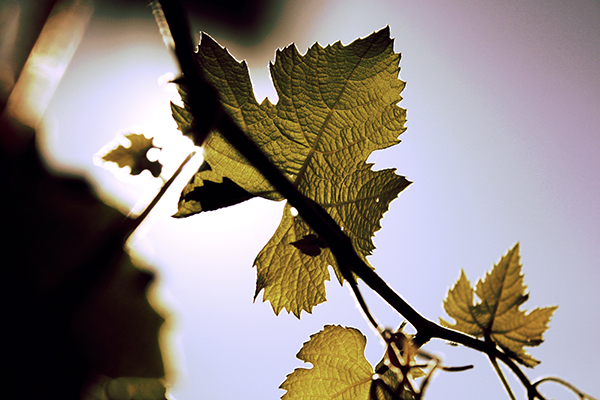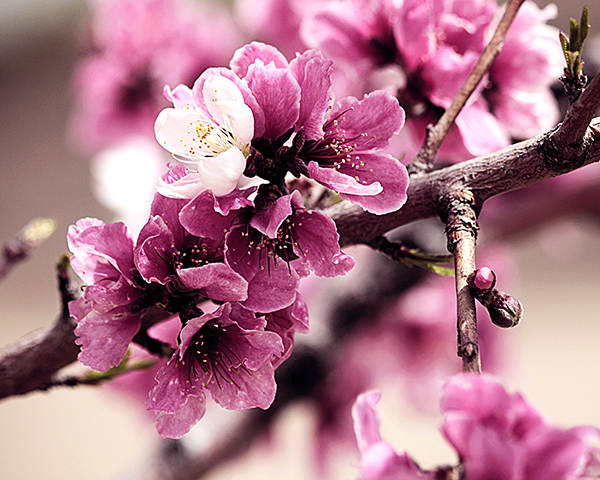In the spring of 2012 I was blessed to help plant 300 young grapevines in our orchard on the university campus at Avalon Gardens & EcoVillage. In the subsequent years, I have helped tend them. I am no vintner, but I read up a little bit on grapes and how to prune and train them. It is a true art, one that I do not feel called to spend a lifetime pursuing, but until a master vintner comes to lay claim to the position, I will continue to tend the vines.
 I have been struck by the many parallels and life-lessons offered in the vineyard, the first ones being patience and sacrifice. Growing a vineyard is a long-term project and not an undertaking for people who are looking for instant gratification. One fine May morning I went out to the vineyard and discovered that our grapes had set beautiful little bunches of fruit. I was so excited, I nearly forgot the next step in tending first-year vines, cutting all that fruit off.
I have been struck by the many parallels and life-lessons offered in the vineyard, the first ones being patience and sacrifice. Growing a vineyard is a long-term project and not an undertaking for people who are looking for instant gratification. One fine May morning I went out to the vineyard and discovered that our grapes had set beautiful little bunches of fruit. I was so excited, I nearly forgot the next step in tending first-year vines, cutting all that fruit off.
In order to secure the health and vitality of the vine and its young root-system, grape-growers recommend allowing the vine to develop a few years before allowing it to produce fruit. Although it pained me to do so, I stripped the vine of its young bunches of grapes, knowing that it was a sacrifice for better growth to come.
This theme of trimming and pruning continues as the growing seasons progress. There are only so many nutrients and minerals in the soil and stripping the vine down to a central trunk allows the growth to be concentrated. In spring, several branches may appear, but a decision must be made. Like in life we may be presented with myriad options; some promising, others not so much, but we cannot flounder in indecision. We must make the choices that foster the future. Pruning, by its nature, is a very absolute and decisive activity.

Grapes are vigorous growers. Even after selecting a “central leader” and tying it up to the trellis to become a trunk, the grapevine will send out multiple side-branches. If left untended these branches would likely take over a whole garden! Growers recommend that you never allow the vines to gain the upper-hand. You have to show the vines who’s boss. This requires diligence and dedication because the vines are relentless in wanting to reproduce.
It took a little getting used to, but trimming the grapes has become a relaxing and meditative task. I started to see all the shoots that I was removing like thoughts in my stream of consciousness that keep sprouting up, nearly beyond my control. Banal thoughts from my lower nature springing up from the base of the vine, utterly useless, crowding the trunk, weak and brittle, and never bearing fruit. Other fruitless thoughts, futile and erroneous. The quicker I can nip them in the bud, the more developed my main branches can become. Even the loftiest branches, the ones that shoot up past the trellis in noble aspirations, will never be strong enough to bear the heavy bunches of grapes. It is better to consolidate the growth, to focus my thoughts, to know my limitations and bear good fruit.

Of course the greatest vine analogy that still echoes through the world is the talk that the Master gave on the vine and the branches. It takes on a new depth and complexity for me after having played husbandman and cut away so many dead and fruitless branches these past years. The passage appears in the Bible at the beginning of John, Chapter 15, but I suggest reading the corresponding section from The URANTIA Book titled “The Vine and the Branches,” found in Section 2 of Paper 180.
The talk is a sobering reminder that we are all branches stemming from a common vine. Together, we are bound by a common origin, a single Creator. Only when we are connected to that living essence of that Creator can we bear fruit. In fact, bearing fruit is all we can do. If we do not, we become detached from the one true vine and wither.
The Master spoke of the vine again, after the resurrection, when he appeared to the people of Phoenicia and said:
And the fruits of the divine spirit which are yielded in the lives of spirit-born and God-knowing mortals are: loving service, unselfish devotion, courageous loyalty, sincere fairness, enlightened honesty, undying hope, confiding trust, merciful ministry, unfailing goodness, forgiving tolerance, and enduring peace. If professed believers bear not these fruits of the divine spirit in their lives, they are dead; the Spirit of Truth is not in them; they are useless branches on the living vine, and they soon will be taken away. My Father requires of the children of faith that they bear much spirit fruit. If, therefore, you are not fruitful, he will dig about your roots and cut away your unfruitful branches. Increasingly, must you yield the fruits of the spirit as you progress heavenward in the kingdom of God. You may enter the kingdom as a child, but the Father requires that you grow up, by grace, to the full stature of spiritual adulthood.1
The title of the article, “Our Life is What our Thoughts Make it,” is a quote from second-century Roman Emperor, Marcus Aurelius who, among other things, also said, “We ought to do good to others as simply as a horse runs, or a bee makes honey, or a vine bears grapes season after season without thinking of the grapes it has borne.” I think the Divine Husbandman would approve.
ENDNOTES:
1 The URANTIA Book, Paper 193, Section 2

